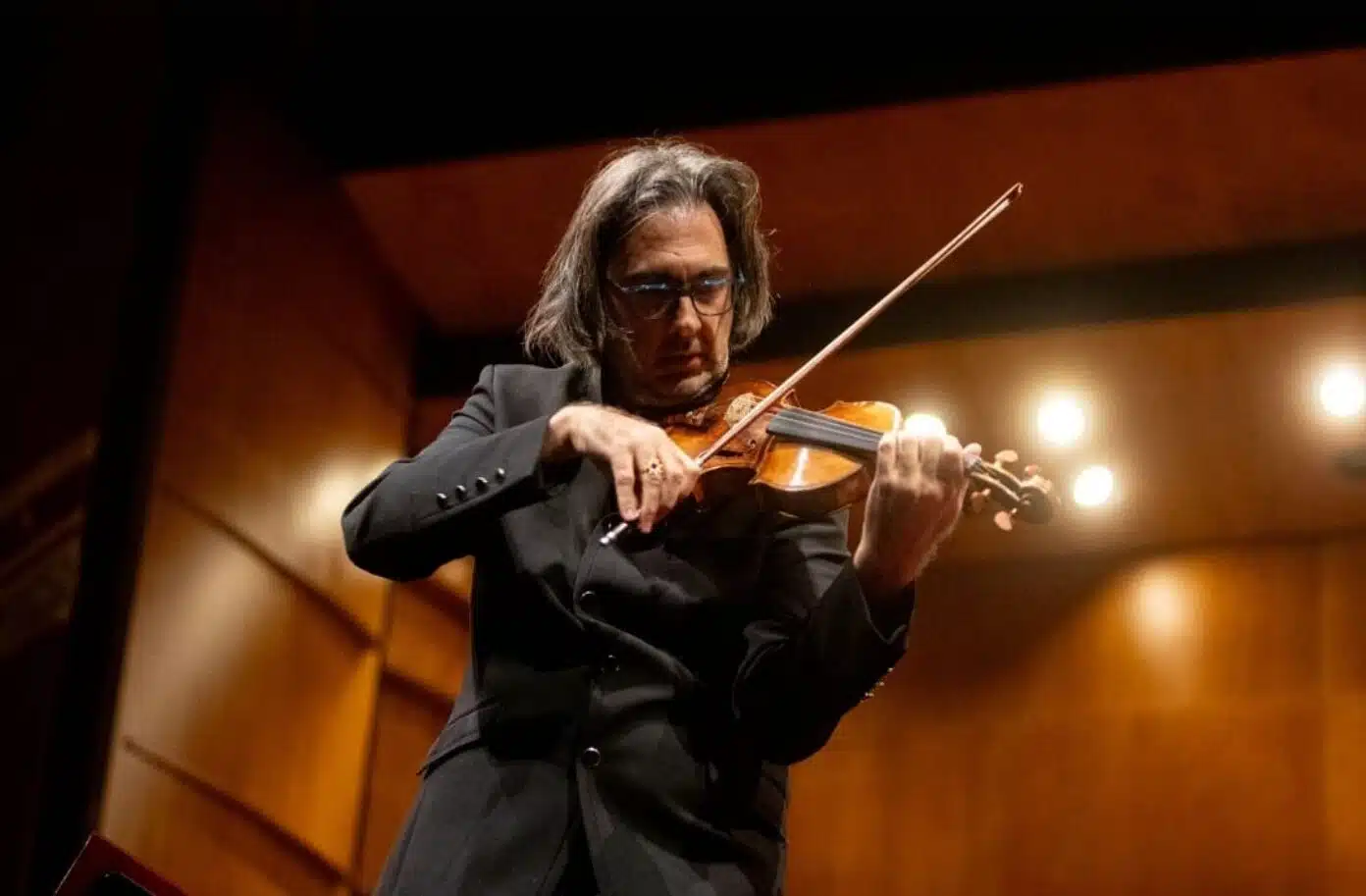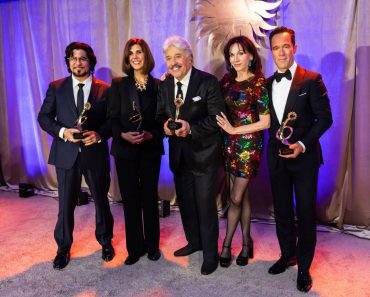
‘We knew that Athens did not need another concert hall. On the contrary, insisting on its nonprofit nature, we imagined and designed how the Athens Conservatoire could operate in an autonomous and completely sustainable way as a multifunctional space for education, production and hosting events,’ Nikos Tsouchlos, head of the Athens Conservatoire, tells Kathimerini. [Nikos Kokkalias]
In the vanguard of the Greek capital’s artistic production, Nikos Tsouchlos, head of the Athens Conservatoire, has been one of the most discreet and effective voices in the field. Low-key but highly successful in every position he has held, he is considered a visionary and a man of action, a musician as well as a manager and a teacher. After serving as artistic director of the Athens Concert Hall (Megaron), and while working as associate professor in the Department of Music Studies at the Ionian University since 2014, he has once again attracted attention as he is credited with the revival of one of the country’s longest-running artistic organizations.
What is the secret of the success of the Athens Conservatoire?
Something paradoxical was happening with the Athens Conservatoire. The ambition that the emblematic building of Ioannis Despotopoulos radiated was greater than the organization’s capacity. The state’s “gift” with the relocation to the new building in the 1970s proved to be a double-edged sword. Because on the one hand it was a building of high architectural and artistic ambition and on the other hand it was clear that it was never possible to maintain such an ambitious infrastructure of 14,000 square meters solely with income from piano, clarinet or dance lessons. The result was the accumulation of debts and pending legal proceedings that created a sense of entrapment and an impasse.
And how did you get from the “perfect impasse” to the plan to complete the building and create new infrastructure that brought the conservatory out of a peculiar isolation and re-established it on the city’s arts scene?
The conservatory would have been perfectly viable if it were housed in a conventional two- or three-story building anywhere in Athens. But we realized that the main asset of this organization was its building, a blessing and a curse at the same time. Therefore, to get out of the impasse we had to do something with this hidden ace up our sleeve that threatened to throw us into the abyss but also to pull us out of the impasse. At the same time, we also saw the moral obligation we had to society: to have in our hands such an architectural treasure which we had to utilize and finally give it the function for which it was built.
You are telling us that you chose a soccer tactic – that “attack is the best defense.”
The late Despotopoulos helped us with this. Because we are talking about a building that forces you to realize – even if you don’t want to – that the education of young artists cannot be constantly done within an enclosed bubble. It is something that should be in constant dialogue with the real world out there. The board of directors saw this in 2013 and we started right there. We knew that Athens did not need another concert hall. On the contrary, insisting on its nonprofit nature, we imagined and designed how the Athens Conservatoire could operate in an autonomous and completely sustainable way as a multifunctional space for education, production and hosting events.
There is, however, regular state funding, right?
Indeed, regular state funding of around 600,000 euros per year is foreseen, which means that we can do our work without charging high tuition fees. In fact, it covers almost half of the operating costs of our schools. With the completion of the building [it was inaugurated in 1976, still unfinished] and the operation of the Arts Center at the end of 2022, operating costs increased significantly, but at the same time, revenues from its concession to private entities for events, conferences, concerts, festivals etc increased even more. In this way, in addition to financial rationalization, we achieved a parallel added value for our students: We provided the impetus to break this protective cocoon in which artistic studies usually reside. Bringing together students of music, theater and dance with all these creative liberties that are now taking place in the new areas of the Arts Center.
The big school
In 1991, the year of the inauguration of the Athens Concert Hall, its then-president Christos Lambrakis appointed the conductor Nikos Tsouchlos, then just 30 years old, as director of artistic programming of the Greek capital’s new cultural landmark. It was a choice that surprised many, especially Tsouchlos’ older peers, who expected someone more compatible with the times than the music-loving president of the Friends of Music Society. But the young Tsouchlos had already managed to chart a particularly creative trajectory, having already earned the trust of renowned composer Manos Hadjidakis as his assistant in the Orchestra of Colors, as well as composer Thanos Mikroutsikos, who was the man who introduced him to Lambrakis. At the same time, his particular interest in contemporary musical creation, which is today documented through numerous first performances of works by important Greek composers, was an element that had made Tsouchlos a very promising figure in the new generation of musicians and musicologists.
How do you view that era today?
The Athens Concert Hall was without a doubt a huge school for me, in terms of how you set up a long-term strategy for an ambitious but young institution, a strategy that survives to this day – the extroversion of the Megaron, its educational dimension, as a window of communication between Greek and international artists. Personally, it gave me skills in culture administration that I could never have imagined. But at the same time, it was also a school of professionalism. Christos Lambrakis, as we all know, was an extremely strong personality and I personally owe him great gratitude. He was the one who imposed a very strict professionalism on the way things worked.
Ominous predictions are sometimes made about the appeal of classical music to the new generations born with a mobile phone in hand.
If we musicians, with our tailcoats and our silent, church-like, expensive concert halls, continue to look down on the public, as representatives of high art addressing some lower beings, we risk suffering what the Democrats suffered [in the US] from [president-elect Donald] Trump. The good news is that there is a generation of musicians under 30 who are incredibly skilled, incredibly talented and have a way of presenting themselves to the world that is completely human and not at all condescending, and they are my hope. But if we musicians, who have this tendency, remain in our tailcoats, locked in expensive concert halls with the very strict ritual of a classical music concert, where the audience is forbidden to cough, sneeze, or applaud between parts, a completely ecclesiastical ritual, then we are talking about an enclosed environment that we must revisit. I am not saying to throw away the tailcoat and put on jeans – that is not the point. But we must revisit what we are doing, where the joy of this whole story lies.
Classical music in the age of TikTok
One of Tsouchlos’ biggest concerns is how adaptable the world of symphonic music will be to the new circumstances. “Classical music has one disadvantage compared to other genres: the disadvantage of duration. It requires concentration while we are moving in a direction of multi-distraction. But there are ways that one can work to deal with this new reality.”
For example?
We are talking about a live performance. The live collaboration of four musicians or the musicians of an orchestra on stage is something irreplaceable and exceeds the most perfect specifications of a digital reproduction. And we are trying to keep that alive here. There is a strong desire or curiosity for experiences in a live environment and I see it in most parents who bring their children to the conservatory. Because they do it precisely for the experience of this exchange, even if this does not lead to a degree in music or even more to a career as a musician.







